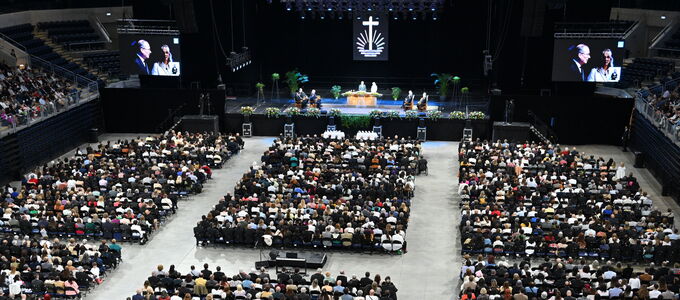
The same talent for everyone and many different talents for each individual: this is the interpretation of a familiar parable taken from a divine service by the Chief Apostle.
The words of the Bible text used are well known: “His lord said to him, ‘Well done, good and faithful servant; you were faithful over a few things, I will make you ruler over many things. Enter into the joy of your lord’” (Matthew 25: 21). This was the central theme of the divine service on 7 April 2024 in Montevideo in Uruguay.
A man gives his servants different amounts of money. The Bible refers to it as talents. Two of the servants work with the money until their lord returns, while the third man is content to preserve what has been entrusted to him. The parable of the talents teaches us what Jesus expects from the believers, Chief Apostle Jean-Luc explained and asked, “What does that mean for us today?”
Gifts: one the same, and many different ones
“All of us have received the one same talent, a spiritual gift.” Through the rebirth out of water and the Spirit, we have all received the same divine life, the same gift of the Holy Spirit, and the same love that has been poured into our hearts.
In addition, God has given everyone different gifts, such as our personality: “Some have manual skills. Others have intellectual aptitudes. Still others are artists.” Or our living conditions: “Some have a lot of money. Others are very poor.” Also the environment in which we live: “Some were born in a country where society is very restrictive. Others were born at a time when society was very open.” And finally, there are the conditions within our congregations: “Some are part of a growing congregation, others are part of a shrinking congregation.”
Knowing what we owe
“Different gifts, and we cannot understand why they are so different,” the Chief Apostle said. “But now God comes and says, ‘I want you to be faithful with all these talents. Be faithful servants.’”
The faithful servant knows that everything he has comes from God. And he knows that he is indebted to God. And what is the believer indebted to God for today? “Let us be faithful and keep our promises to God,” the Chief Apostle said. The promises we made at baptism or confirmation, at our own wedding, the baptism of our children, or at certain times in prayer.
Making the most of our spiritual gift
“The master wanted them to multiply the talents.” To this day it still means that we must work with the gift of the Holy Spirt. It is not enough to be a good New Apostolic Christian, to go to church, and to give our offerings regularly. “Jesus wants us to grow and change,” the Chief Apostle urged. And then he asked some questions to help us examine ourselves.
- What about your trust in God? Has it become stronger or weaker? What about your love for God?
- Why do you serve to get something, a wage, a reward, or a blessing? And if you get nothing, no thanks, no congratulations, no blessing, are you then upset?
- How long do you need to forgive your neighbour? Less or more time than in the past? Is the list of people you love despite their differences longer or shorter than in the past?
Making the most of earthly gifts
“What about all the other gifts?” the Chief Apostle asked. “We are aware that what we have we owe to God. And we should use these gifts to serve God and to do good works.” So, use your abilities and skills to serve the Lord in many ways. Use them to do good. You don’t need to give all your money to the poor. Enjoy your money. That is okay. But don’t forget God, don’t forget your neighbour.”
“And don’t be silly. Don’t forget your own soul and your salvation.” This also applies to all those who have received less, he said. “Don’t forget that you have been given a talent: your salvation. The fact that you did not get any others should not be an excuse to do nothing.”
“Be faithful until the end, even in the small things of daily life,” Chief Apostle Schneider appealed. “Those who remain faithful in this sense until the end will enter into the joy of the Lord, the joy of those who overcome death and evil like Jesus Christ. But we can already share in this joy, the joy of those who know that Jesus and God are with them.”


















